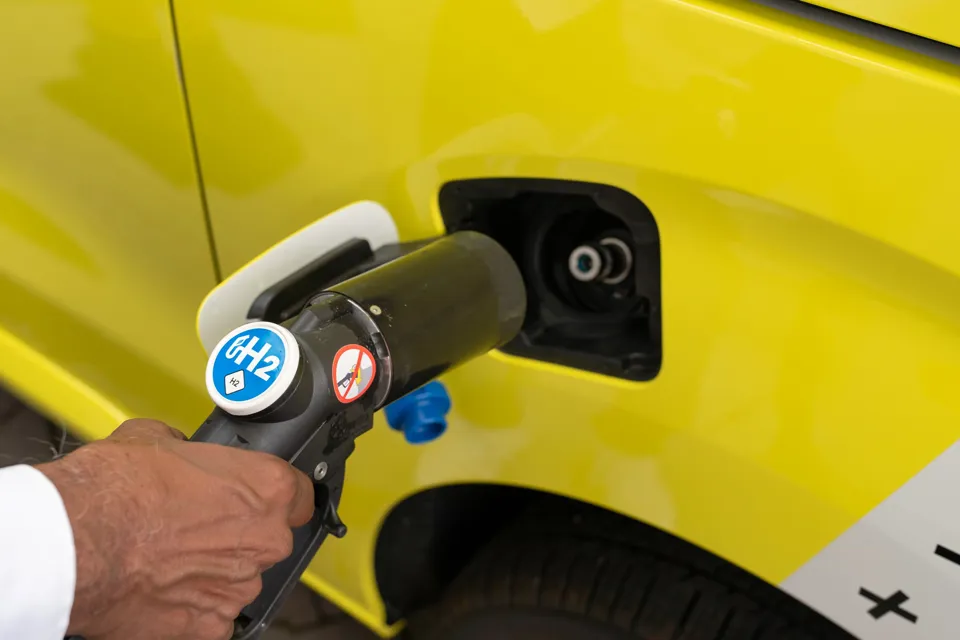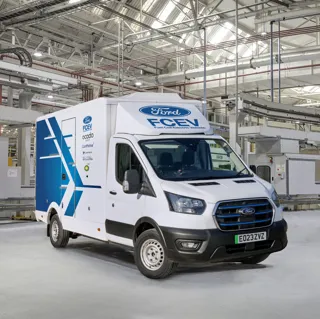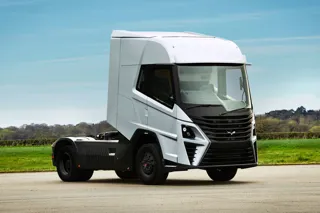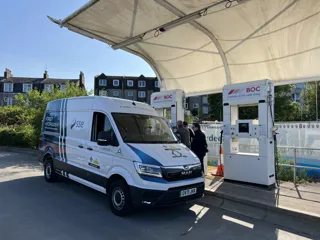A network of hydrogen refuelling stations will be built to help fuel supermarket deliveries in the north-east of England.
Element 2 will create four new publicly accessible hydrogen refuelling stations, which will be used to fuel a range of vehicles, from airside vehicles to heavy goods vehicles (HGVs), including supermarket delivery trucks.
It is one of two projects to win a share of £8 million in Government funding to support and develop hydrogen-powered transport in the region.
The second project, led by ULEMCo, will develop hydrogen-powered airport ground-based support vehicles, such as tow trucks for aeroplanes and sweepers to clean runways.
This will be based at Teesside international airport, which will help the airport reach its goal of being net zero by 2030.
Transport minister Mark Harper said: “Hydrogen technology has great potential to decarbonise transport and help grow the economy.
“Today’s winners illustrate the expertise the Tees Valley has as a pioneer in developing hydrogen tech. This investment will provide a further boost to the economy, creating skilled jobs and apprenticeships across the North East.”
This latest funding marks the continued growth of the UK’s only hydrogen transport hub in the Tees Valley.
Since the Hub was launched in 2021, the region has benefited from millions in Government funding and private investment.
Recent forecasts have estimated that by 2030, the hydrogen sector could support over 12,000 jobs nationally and unlock over £9 billion in private investment.
Innovate UK executive director for net zero, Mike Biddle, said: “Today’s announcement of these new projects in the Tees Valley further adds to our significant partnership with DfT to accelerate new technologies to decarbonise transport.
“This includes nearly £300 million of investment from DfT via Innovate UK in transport decarbonisation across maritime, heavy goods vehicles and hydrogen.”
The competition invited ideas on how to overcome some of the challenges of scaling-up hydrogen technology, such as refuelling on a large scale and making the region’s supply chain greener with hydrogen-fuelled vans and HGVs.
This is the second round of government competition funding for the Tees Valley hydrogen transport hub following the first round, which focused on developing hydrogen-powered vehicles.
The first competition saw over £2.6 million awarded to various winners to deploy 21 hydrogen-powered vehicles.
One of the winners was Toyota, which provided hydrogen vehicles for local police forces, and Hydrogen Vehicle Systems, which developed a hydrogen-powered van for large supermarkets to deliver largescale groceries.
HVS five-point plan to accelerate hydrogen power

Coming at the same time as the funding announcement, HVS (Hydrogen Vehicle Systems) has unveiled a five-point plan outlining the key steps required to realise the widespread adoption of hydrogen-powered HGVs.
It is calling for clarity on detailed timescales, supported by policy incentives to encourage early adoption of vehicles. This includes changes to legislation, green hydrogen production subsidies and commitments to infrastructure development, as well as support for workforce training.
HVS’ roadmap aims to propel the industry forward, enabling more rapid decarbonisation of the goods delivery sector, and helping the UK to meet its commitment to achieving net-zero targets.
Jawad Khursheed, CEO of HVS, said: “HVS' hydrogen technology holds a major key in supporting governmental emissions reduction targets, both here in the UK and in Europe, through the decarbonisation of the heavy goods sector.
“However, change in this market is not happening quickly enough – which is why, today, we are unveiling this five-point plan, outlining a roadmap that will accelerate the transition to hydrogen HGV fleets.
“This industry desperately needs clarity from the UK Government on incentives to encourage the early adoption of hydrogen HGVs, alongside commitments to support the development of new H2 technology, green hydrogen infrastructure and revisions to regulations.”
He continued: “Our roadmap shows how the haulage industry can seamlessly move from fossil-fuelled fleets to green hydrogen HGVs, enabling the UK to remain competitive globally and ensuring climate change goals are met.”
The five-point plan calls for incentives to generate confidence to invest in new fleets; legislation and regulatory framework changes; green hydrogen production; infrastructure development; and skilled workforce and training.























Login to comment
Comments
No comments have been made yet.